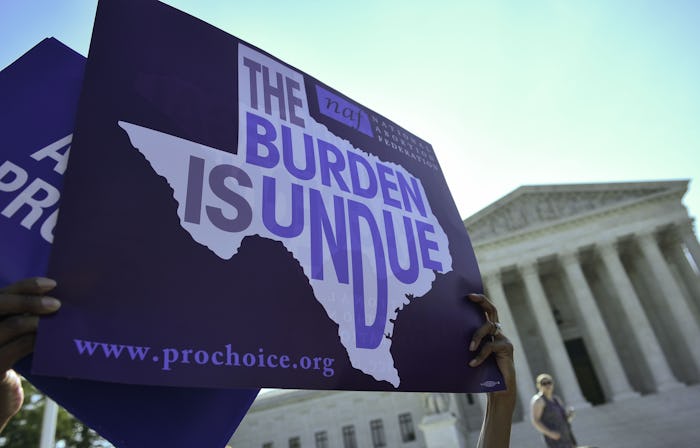News

Texas Will Require Fetal Remains To Be Cremated Or Buried, & It Presents An Undue Burden
In a highly controversial ruling, the state of Texas will change what happens to products of conception after an abortion or miscarriage. Starting Dec. 19, new rules will take effect regarding what happens after an abortion is performed in the state: Texas will now require fetal remains to be cremated or buried.
This controversial ruling comes in the midst of reproductive rights uproars throughout the U.S. in the wake of the election of president-elect Donald Trump, who is staunchly anti-abortion (though he was pro-choice for years before his campaign) and has vowed to create a conservative, anti-abortion cabinet. In addition to talk of attempting to dismantle Roe v. Wade, Trump's vice president Mike Pence already has a track record of lawmaking similar to what's been passed in the state of Texas. Pence came under fire with pro-choice advocates in his home state of Indiana back when he was governor and tried to pass a law that would have mandated funerary services for aborted fetuses. More or less, the law that Pence tried to pass in Indiana is what passed in Texas.
Products of conception, not unlike any other human tissue removed from the body, are handled in a sanitary, strictly standardized way. It's a matter of procedure and policy in most healthcare settings that any tissue removed from the body (pathological waste) goes through the pathology department, after which point it's disposed of in accordance with standards meant to protect the health and safety of the living.
In the same way that any human tissue gathered in a medical setting needs to be disposed, products of conception are often incinerated, according to the Environmental Protection Agency. While a similar process to cremation, cremation generally has a spiritual or religious connotation to it.
The Human Tissue Authority of the United Kingdom states that when it comes to making a decision for disposal after an abortion, whether desired or the necessitated by miscarriage, "Women define their pregnancy according to their own circumstances, values, understanding and beliefs," — a stance that doesn't seem to be the default in America.
In Texas, this new ruling will mean that miscarried and abortion fetuses (with the exception of those that occur at home) will be required to be cremated or buried, forcing a specific set of "values, understanding and beliefs" on all Texas women. After intense questioning, the state did also rule that birth and death certificates will not be a requirement, according to The Texas Tribune. Texas Gov. Greg Abbott signed off on his approval and stated that fetal remains should not be “treated like medical waste and disposed of in landfills,” according to The Washington Post, and that this new law will add “enhanced protection of the health and safety of the public.”
Many are in opposition to the law, and it's not just women: funeral directors, medical professionals, and other lawmakers were present throughout the hearings, which have been ongoing since July. Women who had undergone abortions as the result of miscarriages testified that had this new law existed at the time of their experience, it would have infinitely worsened the emotional trauma of their situation. Denee Booker, who miscarried after a car accident, opted to have the fetal remains removed instead of allowing them to pass naturally, and told those present at a hearing in August, according to the Texas Tribune:
That I would have had to take or make either of those decisions is mind-boggling and terrifying. I can’t imagine how much worse that would’ve made my situation.
The Texas Medical Association and the Texas Hospital Association also sent a joint-letter stating their concerns, including questions about how spontaneous miscarriages would be addressed under the proposal and about who is responsible for the costs of interment.
In an article for The Atlantic, writer Emma Green pointed out that, while cost may not be a burden on the individuals, funeral parlors may have to allocate staffing resources to the task that has traditionally been taken care of by third parties that liaise with healthcare organizations.
The one thing both sides of the decision seem to agree on is the motivation for the law: that those who passed it believe, and want to ensure by law: that fetuses are regarded as human even though that belief is a religious one that is not supported by medical science.